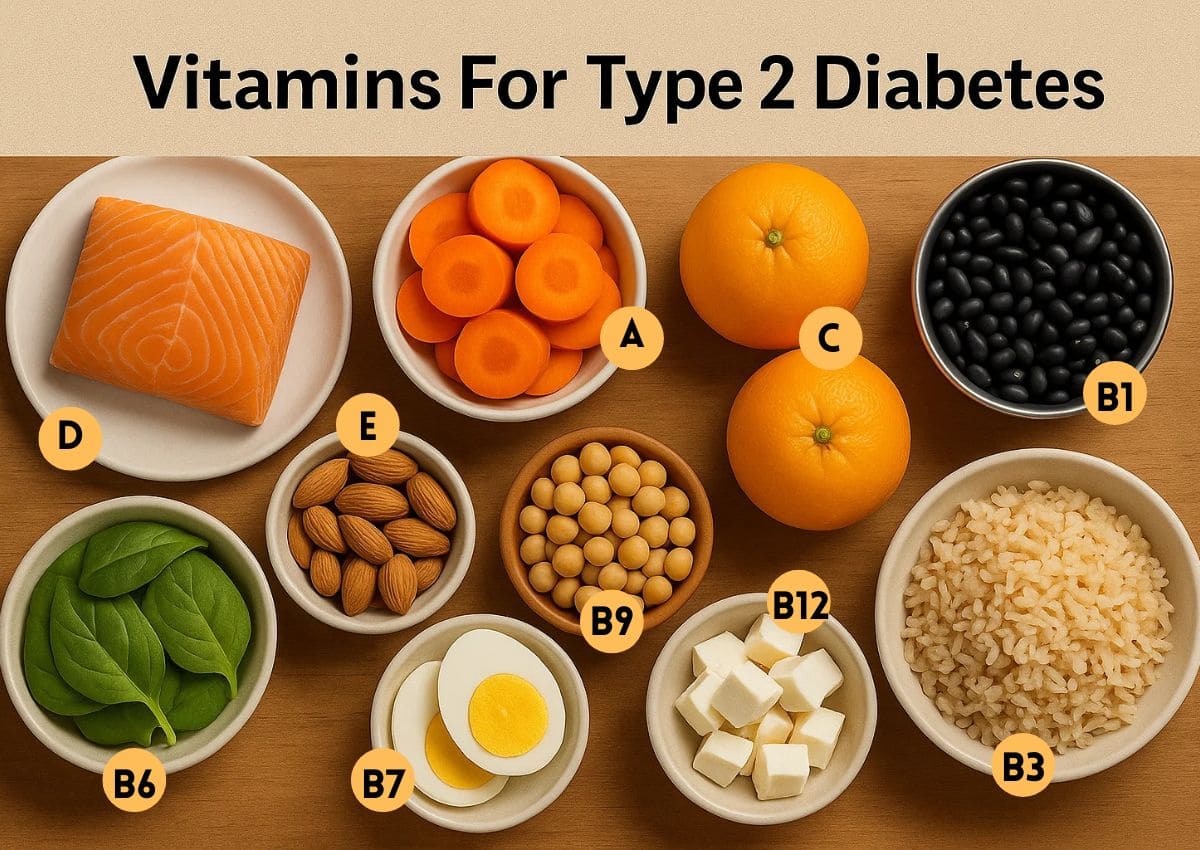
Managing Type 2 Diabetes and potentially reversing it is quite easy if you know ways to enhance overall health and improve glycemic control. This can be accomplished with a balanced diet rich in nutrients and vitamins, a dedicated exercise routine, treatment, and supplements (if necessary.) Vitamins play a vital role in enriching the metabolic functions. They help in
- Blood sugar regulation
- Enhancing nerve health
- Enriching energy metabolism
- Combating oxidative stress
- Safeguarding cardiovascular health
- Improving immunity
- Weight management
Let’s discuss the important vitamins for Type 2 Diabetes and the roles they play in keeping us hale and healthy. Strive for a mix of all vitamins on a daily basis.
Vitamin D
Vitamin D is a vital vitamin that supports insulin sensitivity and glucose metabolism. Usually low levels of Vitamin D are associated with increased insulin resistance. Upping your intake of D Vitamin is proven to enhance insulin sensitivity and blood sugar control.
Few sources of Vitamin D –
- Fatty fish (i.e. salmon)
- Fortified dairy products
- Egg yolks
- Sunlight exposed mushrooms
- Sun exposure
Vitamin A
Vitamin A is considered integral for smooth immune function and healthy vision. While the direct connection of Vitamin A to managing Type 2 Diabetes is less established, Vitamin A combats oxidative stress and supports overall health. Hence Vitamin A may reduce complications like diabetic retinopathy and cardiovascular damage.
Few sources of Vitamin A –
- Carrots
- Sweet potatoes
- Spinach
- Liver
Vitamin E
Enriched with powerful antioxidant properties, Vitamin E protects cells from oxidative stress. It is also known to improve insulin sensitivity and lower blood sugar levels, thereby improving overall glycemic control. It is also known to enrich cardiovascular health.
Few sources of Vitamin E –
- Nuts & Seeds (i.e. Almonds)
- Spinach
- Vegetable oils
Vitamin C
Vitamin C is considered a vital vitamin known for its immune-boosting properties and its role in collagen synthesis. Individuals with Type 2 Diabetes can benefit from this vitamin as it is known to help lower blood sugar levels and enhance insulin function. Its antioxidant properties combat oxidative stress and enrich cardiovascular health.
Few sources of Vitamin C –
- Citrus fruits (i.e. Oranges)
- Strawberries
- Bell Peppers
- Broccoli
Vitamin B1
Also known as Thiamine, Vitamin B1 is vital for carbohydrate metabolism and energy production. It helps the body convert glucose into energy, thereby moderating blood sugar levels. It is also known to help protect from the diabetic complications like diabetic neuropathy.
Few sources of Vitamin B1 –
- Whole grains
- Pork
- Legumes (i.e. Black beans)
Vitamin B3 (Niacin)
Also called Niacin, Vitamin B3 helps individuals maintain healthy cholesterol levels, thereby combating cardiovascular issues and improving overall metabolic health. Both of these traits are beneficial for individuals with Type 2 Diabetes. It is recommended to take this vitamin at moderate levels.
Few sources of Vitamin B3 –
- Meat
- Fish
- Poultry
- Whole grains (i.e. Brown rice)
Vitamin B6
Vitamin B6 plays a crucial role in glucose metabolism and blood sugar level regulation. It enriches nerve function and health, thereby preventing diabetic neuropathy. It is recommended to enrich yourself with adequate levels of vitamin B6 to support metabolic health and enhance overall well-being.
Few sources of Vitamin B6 –
- Poultry
- Fish
- Dark leafy greens (i.e. spinach, kale)
- Potatoes
- Non-citrus fruits
Vitamin B7 (Biotin)
Also called as Biotin, Vitamin B7 plays an important role in the metabolism of carbohydrates, fats, and proteins, thereby helping maintain stable blood sugar levels. It improves insulin sensitivity and glucose metabolism. Biotin deficiency is the core reason for various metabolic issues, adequate intake is important.
Few sources of Vitamin B7 –
- Eggs
- Nuts
- Seeds
Vitamin B9 (Folate)
Known as Folate, Vitamin B9 is crucial for DNA synthesis and repair. It plays a crucial role in reducing homocysteine levels, which are usually elevated in individuals with diabetes. Adequate folate levels can enhance insulin sensitivity, thereby contributing to better blood sugar control and overall cardiovascular health.
Few sources of Vitamin B9 –
- Leafy greens
- Legumes (i.e. chickpeas)
- Fortified grains
Vitamin B12
Vitamin B12 is essential for nerve health and red blood cell production, thereby helping individuals with Type 2 Diabetes combat diabetic neuropathy. This vitamin enriches nerve function and supports overall metabolic health.
Few sources of Vitamin B12 –
- Meat
- Diary
- Eggs
- Paneer
- Fortified foods
So, vitamins are an essential part of managing Type 2 Diabetes as they not only help regulate blood sugar, but also improve the body’s ability to respond to insulin. Additionally, they support overall health and help protect against diabetes related complications.
If you are planning to take vitamin supplements, it is important to discuss this with your healthcare provider. As high doses of certain vitamins are detrimental to the health of some individuals with Type 2 Diabetes, this approach is crucial.
Being mindful and ensuring you get enough of these key vitamins through diet or as supplements, can play a significant role in controlling diabetes and improving your quality of life.
